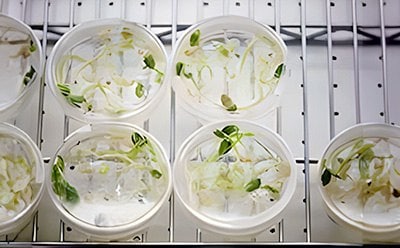Plant Tissue Culture

Plant tissue and cell culture describes the sterile growth and multiplication of plant cells, tissues, and organs in vitro. Plant cells cultured with nutrient media in an artificial environment can be clonally propagated at scale, to more quickly produce mature and disease-free plants. High-quality, uniform planting materials can be rapidly propagated for applications in molecular genetic engineering, plant breeding, horticultural production, and environmental conservation. Such materials can also be used for plant science, phycology, and pharmaceutical research.
In many common plant cell culture processes such as seed culture, meristem culture, callus culture, bud culture, and another culture, tissues are placed on a gel substrate such as Murashige and Skoog (often called MS media, MSO, or MS0) or Gamborg B5 medium. Tissues may also be placed into a liquid medium, as is the case with cell suspension culture. The plant culture media formulation may include macronutrients, micronutrients, vitamins and organic supplements, amino acids and nitrogen supplements, plant growth hormones and plant growth regulators (PGRs), and will vary depending on specific plant needs.
Recent developments in bioengineering and plant science have advanced plant tissue and cell culture processes.
Featured Categories
Cultivate cells, organs, tissues with plant culture media like MS, B5, Phytamax™ Orchid Medium, enriched with nutrients and regulators.
Plant tissue culture reagents, including gelling agents, plant growth regulators, auxins, cytokinins, and other supplements for supporting the growth and development of plant cells and tissues in culture.
Milli-Q® systems offer innovative water purification technologies engineered to support lab research needs, sustainability goals, and other major requirements.
We offer agarose bioreagents in grades suitable for cell culture and molecular biology applications from chromatography to nucleic acid & protein gel electrophoreses.

Plant pathogen screening for species conservation
Microbial contamination can be introduced at every stage of the tissue culture process, which may impose disastrous effects on crucial species conservation efforts. Meticulous tissue culture techniques are used with endangered, threatened, and rare plant species to quickly reproduce materials with a high coefficient of multiplication and rapid expansion from limited initial plant samples. Pathogen screening can prevent significant losses in micropropagation systems, enhancing production efficiency and improving output quality for conservation efforts. Plant tissue culture media that incorporates pathogen screening can help to diagnose, treat, or prevent future contamination, and facilitate faster production of mature and disease-free plants.
Optimized plant growth regulators for pharmaceutical development
Plant secondary metabolites are made up of complex phytochemical components that provide protective or non-essential functions to plants, but may be of significant medicinal value to humans. When applied at the ideal stage of development, elicitors such as plant growth regulators (PGRs) can support cell growth and trigger secondary metabolic pathways that stimulate plant regulatory responses in phenolic and flavonoid synthesis. Plant-derived products such as flavors, fragrances, alkaloids, pigments and pharmaceuticals are of considerable value. Plant tissue culture techniques can support a cost-effective, sustainable, and controlled means of production of these products, time to market and expedite commercial applications.
Protoplast isolation and culture for crop improvement
Plant tissue culture techniques can be used in plant breeding efforts to meet growing global food demands. Protoplast isolation and culture allows plant breeders to overcome the challenges of traditional breeding and to facilitate gene transfer that permits testing for desirable characteristics. Protoplasts are cells which lack cell walls and can be used in plant tissue culture systems to regenerate whole plants from a single cell. Crop improvement efforts to increase quality, quantity and efficiency for agricultural crop production can achieve desired hybrids using protoplast fusion, isolation and culture despite incompatibility issues in traditional plant breeding.
Visit our document search for data sheets, certificates and technical documentation.
Related Articles
- Use the tables in this protocol to assist in the preparation of auxins, cytokins, and other regulators for use in plant cell culture media.
- Basal Salts Mixtures, Media including Organics
- Classical plant tissue culture media developed years ago by pioneers such as Murashige, Skoog, Gamborg, and others still play a vital role in plant tissue culture research today.
- To prepare 1L of a 10 X iron chelate solution
- Orchid Culture Media Formulations
- See All (2)
Related Protocols
- Surface sterilizing plant material is an important for plant tissue culture. Commonly used disinfectants for plant tissue culture and methods for disinfecting seeds are included.
- Instructions for preparing alginate, agargel, and phytagel agar to solidify plant tissue culture media, with criteria for product selection.
- Preparation instructions for 0.1 M Sodium Thiosulfate (STS) and 0.1 M Silver Nitrate stock solutions for laboratory use.
- Preparation from Packaged Powder, Preparation from Basal Salt Solutions, Banana Powder Preparation and Use, Coconut Water Preparation and Use
- Reference guide and preparation guide for antibiotic and antimycotic use in plant tissue culture.
- See All (10)
Find More Articles and Protocols
How Can We Help
In case of any questions, please submit a customer support request
or talk to our customer service team:
Email custserv@sial.com
or call +1 (800) 244-1173
Additional Support
- Chromatogram Search
Use the Chromatogram Search to identify unknown compounds in your sample.
- Calculators & Apps
Web Toolbox - science research tools and resources for analytical chemistry, life science, chemical synthesis and materials science.
- Customer Support Request
Customer support including help with orders, products, accounts, and website technical issues.
- FAQ
Explore our Frequently Asked Questions for answers to commonly asked questions about our products and services.
To continue reading please sign in or create an account.
Don't Have An Account?



